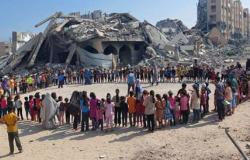After the major attack against Israel carried out on Tuesday by the Islamic Republic of Iran, several experts believe that the spiral towards a regional war is already underway.
The Middle East has already been under high tension for almost a year with the war in the Gaza Strip triggered by the unprecedented attack launched on October 7 by the Palestinian Islamist movement Hamas against Israel, and which is in the process of extend to Lebanon where the Israeli army is intensifying its offensive against pro-Iranian Hezbollah
After months of escalation, the risk of a shift towards a high-intensity conflict which would spill over to other countries, if it gives cold sweats to the international community, is very real for several analysts.
Very quickly after Iran fired nearly 200 missiles at Israel, Israeli political and military leaders announced that the country would respond.
AFP
Tehran described this attack as just revenge after the assassination, attributed to Israel, of the leader of Hamas, Ismaïl Haniyeh, on July 31 in Tehran, and that, claimed by Israel, of the leader of the Lebanese Hezbollah Hassan Nasrallah, on September 27 in Beirut, in a strike that also killed an Iranian general.
The Lebanese Islamist movement is largely supported by Tehran, of which it is the first regional ally.
Response in Iran
“Iran has made a serious mistake […] and will pay the price,” Israeli Prime Minister Benjamin Netanyahu warned on Tuesday evening.
AFP
Israelis “are obliged [de riposter] because of the scale [de l’attaque] and the fact that there is a change in the nature of the targets targeted by Iran, compared to the first direct Iranian attack on Israel, on the night of April 13 to 14, analyzes David Khalfa, co-director of the Observatory of North Africa and the Middle East of the Jean-Jaurès Foundation.
“We are in the holiday season [Roch Hachana, le Nouvel An juif, avant Kippour, le 11-12 octobre, NDLR]”It’s certainly not the right time for retaliation, but it will probably be quick,” adds Danny Critinowicz, an Iran specialist at the Israel Institute for Security Studies (INSS).
AFP
Since the Iranian attack, Mr. Khalfa recalls, several voices in Israel, including members of the government, have spoken of “a historic opportunity for Israel to definitively settle its score with the Iranian regime.”
Former Israeli Prime Minister Naftali Bennett notably called on Wednesday for a decisive strike to destroy Iran’s nuclear facilities.
Possible strikes?
Among the options, Israeli experts and media are considering strikes on strategic sites or even a cyberattack.
American President Joe Biden spoke on Thursday of ongoing “discussions” on possible strikes against Iranian oil infrastructure.
AFP
After decades of tensions between Israel and Iran, Mr. Khalfa explains that the two countries are now “no longer in a quiet confrontation, but in an open war” which can turn into a “regional war of attrition” .
Mr. Netanyahu, whose country is considered to be the only nuclear military power in the Middle East, has never hidden it: for him, Iran seeks at all costs to acquire atomic weapons, and an Islamic Republic equipped with such a weapon would be an existential threat to his country, engaged since October 7 in a “war for its survival”.
AFP
Tehran has always denied that its nuclear program has other than civilian aims.
Iran “has already made its calculations, they have said it, they are ready,” notes Mr. Critinowicz, for whom an Iranian response to Israeli reprisals will be “rapid.”
Launch of missiles and drones
“Their destructive capacity is without doubt, they can send more than 200, even 300 missiles and they also have drones,” notes Sima Shine, director of the research program on Iran at the INSS, Institute for Studies. on Israeli national security.
AFP
“They may also try to carry out terrorist operations abroad,” she continues, mentioning the possibility of attacks on Israeli diplomatic representations or Jewish community centers.
With each step crossed, the risks of a regional war would increase according to analysts, even if Iran and Israel have said on several occasions that they do not wish to enter into a spiral of violence where cycles of reprisals would follow one another.
Israel is already engaged militarily on several fronts: in the Gaza Strip, where there are still around a hundred hostages taken by Hamas on October 7, but also in the occupied West Bank, and against the Houthi rebels in Yemen, who are targeting it. regularly with missiles or drones.
AFP
And in Lebanon, after days of bombing against Hezbollah, mainly in the south of the country, the Israeli army launched a ground offensive on Monday, which it presents for the moment as limited, and mobilized additional forces against the Shiite movement.
Ultimately, however, “both parties will end up looking for a political solution,” says Mr. Critinowicz, for whom the United States, but also France, in Lebanon, can play a determining role in a return to calm. .





